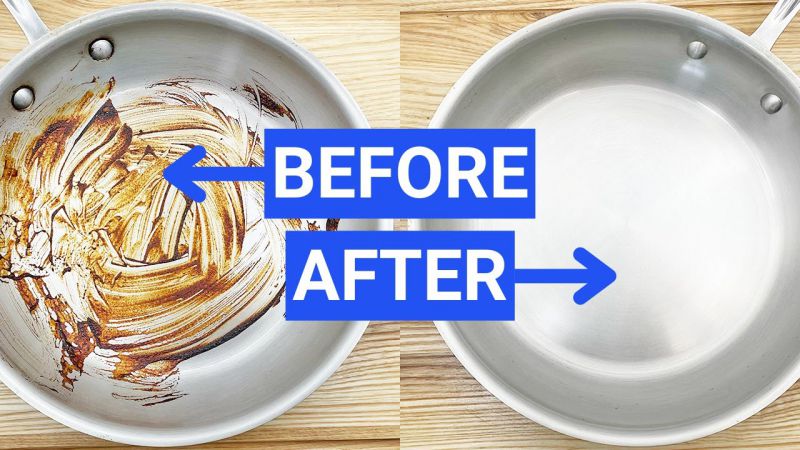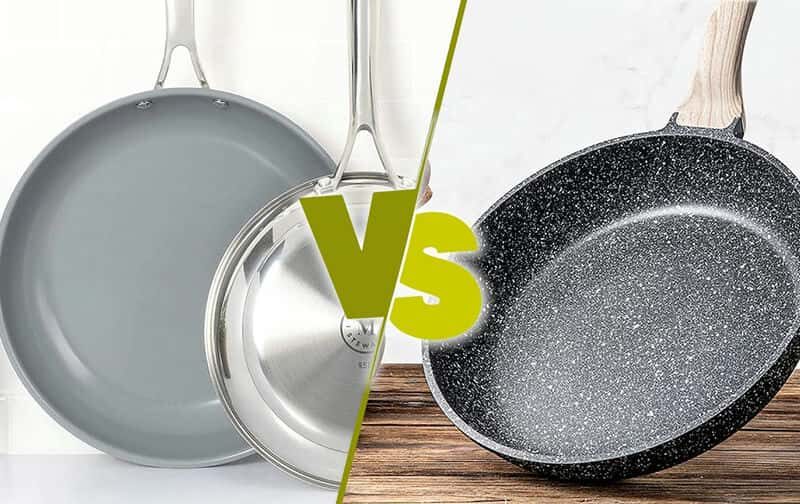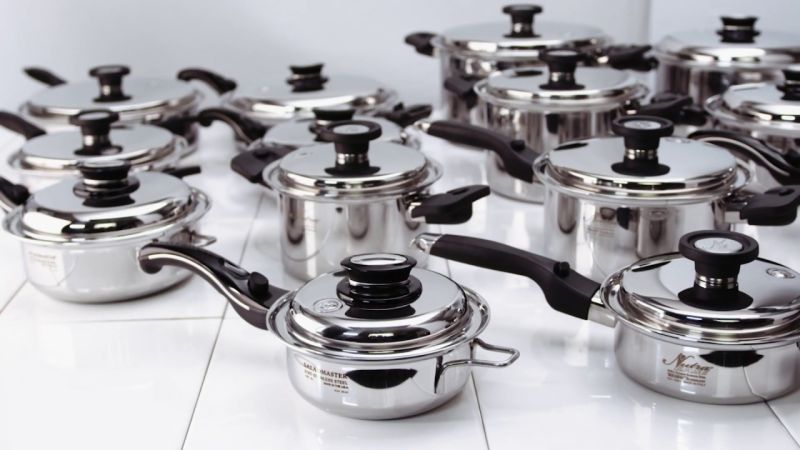All-Clad cookware is an investment worth protecting. These high-end, long-lasting pans can provide you with exceptional cooking performance if you know how to clean and maintain them correctly.
Harsh chemicals and abrasive cleaners can scratch the surface of the pan and damage its non-stick coating, so avoid them at all costs. For tough stains or burnt-on food, fill the pan with warm water and a few drops of soap, let it soak for a few hours, then gently scrub the surface with a non-abrasive sponge or cloth. If the stain still persists, try a baking soda and water mixture or a specialized stainless steel cleaner.
Cooking sprays can also build up on the surface of the pan, leading to a sticky coating, so use a small amount of oil or butter to lubricate the pan before cooking. Regular maintenance of your All-Clad cookware will help it perform at its best and maintain its pristine appearance.
Table of Contents
6 Wonderful Ways To Clean All Clad Cookware
All-Clad cookware is a popular choice for its high-quality and durable construction. Here are six wonderful ways to clean All-Clad cookware:
1: Baking Soda and Water
If you’re looking for an easy and effective way to clean your All-Clad cookware, you can use a simple mixture of baking soda and water.
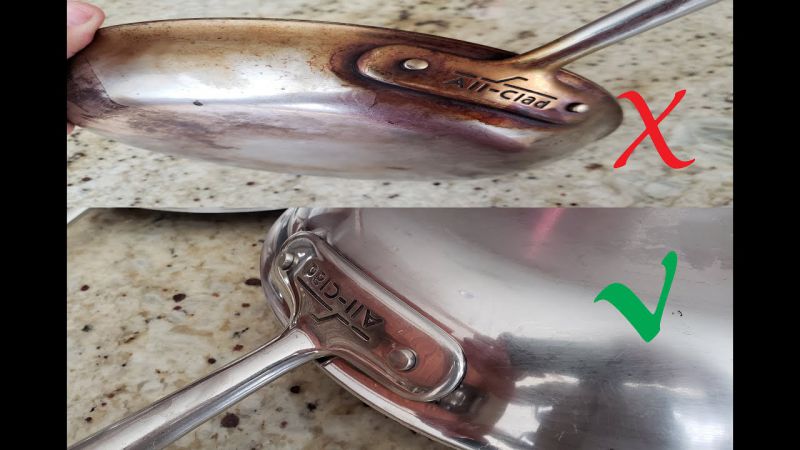 Baking soda is a natural and non-toxic cleaner that can effectively remove stubborn stains and discoloration from the surface of your cookware without damaging it.
Baking soda is a natural and non-toxic cleaner that can effectively remove stubborn stains and discoloration from the surface of your cookware without damaging it.
- To start, mix equal parts baking soda and water to create a thick paste. The baking soda acts as an abrasive, allowing it to gently remove any stains or discoloration from your cookware.
- Once you’ve made the paste, apply it to the surface of your cookware using a soft sponge or cloth.
- Let the baking soda paste sit on your cookware for a few minutes, allowing it to break down any tough stains.
- In just a few minutes, give your cookware a refreshing rinse with warm water and dry it off with a clean towel for a spotless finish.
- You’ll be left with shiny and clean cookware without any residue.
Using this method is easy, cost-effective, and safe. It’s also readily available and inexpensive, making it a great solution for cleaning your All-Clad cookware.
2: Bar Keepers Friend
Bar Keepers Friend is a gentle formula that makes it a great option for keeping your cookware in excellent condition.
- Dampen a sponge or cloth and sprinkle a small amount of Bar Keepers Friend onto it.
- Gently scrub the surface of the cookware, paying attention to any stubborn stains or discoloration.
- To make sure there are no leftovers, rinse the cookware meticulously with warm water.
- Use a clean towel to dry the cookware completely.
Benefits Of Using The Bar Keeper Friend
The benefits of using Bar Keepers Friend for cleaning All-Clad cookware include:
- Its gentle formula is safe for use on all types of cookware.
- Also, it effectively removes stains and discoloration, leaving your cookware looking like new.
- It helps to prolong the life of your All-Clad cookware by keeping it in excellent condition.
3: Vinegar and Water
Maintaining the quality and durability of All-Clad cookware is essential to ensure it lasts for years to come. Cleaning it with a gentle yet effective method is the key to keeping it in pristine condition. Vinegar is a natural, cost-effective cleaning agent that can help you clean your All-Clad cookware without harsh chemicals.
Here are the steps to clean your All-Clad cookware with vinegar:
- Create a versatile and effective cleaning solution by combining water and vinegar in a spray bottle, and mixing them well.
- Spray the solution onto the cookware, making sure to cover all areas.
- Let the solution rest for a while to let the vinegar’s acidity get to work on stubborn stains and discoloration.
- You can easily remove the solution by using the sponge.
- Rinse the cookware with warm water, ensuring that all of the vinegar solutions are removed.
Vinegar’s acidity is what makes it an effective cleaning agent for All-Clad cookware. It can help remove tough stains and discoloration without leaving behind any harmful chemicals or toxins. By using vinegar, you can keep your All-Clad cookware looking new and extend its lifespan. So, the next time your All-Clad cookware needs a thorough cleaning, give vinegar a try and enjoy the results.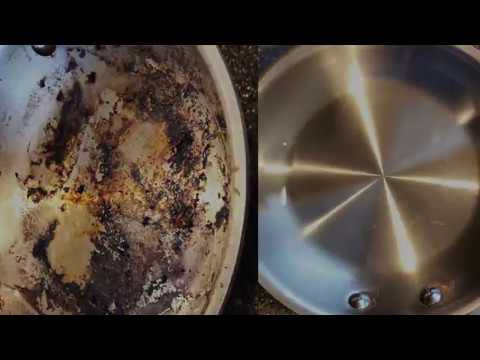
4. Lemon and Salt
When it comes to keeping your All-Clad cookware sparkling clean, you don’t need to resort to harsh chemicals or expensive cleaning products. Lemon and salt are an all-natural and effective cleaning combination that can help you tackle tough stains and discoloration on your cookware.
- To start, simply cut a fresh lemon in half and dip the cut side into a small bowl of salt. The salt will help to gently scrub away any residue or buildup on your cookware. While the acidic juice from the lemon will help to dissolve stains and discoloration.
- Next, rub the lemon onto the surface of your cookware, applying gentle pressure as needed to remove any stubborn spots.
- You can also use the lemon to scrub around the edges and handles of your cookware, where grime and buildup can often accumulate.
- Once you’ve thoroughly cleaned your All-Clad cookware with the lemon and salt mixture.
- After you’ve finished, give it a thorough rinse with warm water, then pat it dry using a fresh towel.
This natural cleaning method works so well because lemon contains citric acid, which is a powerful natural cleaner. Citric acid is effective at breaking down stubborn stains and removing discoloration from a variety of surfaces, including All-Clad cookware.
5. Dish Soap and Water
Maintaining cookware in good condition is crucial for any home cook or professional chef. One of the easiest and most effective ways to clean All-Clad cookware is by using warm water and dish soap. Follow these simple steps for spotless and damage-free cookware.
- Once the sink is ready, immerse your All-Clad cookware in the soapy water and let it soak for a few minutes. This will help loosen any dirt or grime, making it easier to clean.
- Next, you need to scrub the surface of the cookware with a sponge.
- Instead, use dish soap, a mild cleaning agent that helps remove stubborn stains and grease without harming the cookware.
- Be sure to rinse it well to avoid discoloration or affecting the taste of your food.
6. All-Clad Cleaner
Maintaining the longevity and quality of your All-Clad cookware is essential for any cooking enthusiast. All-Clad understands the importance of providing the best possible care for its products, which is why they have designed a special cleaner specifically for its cookware.
The All-Clad cleaner is a highly effective cleaning solution that helps to remove tough stains and discoloration from your cookware. It is specially formulated to be gentle on your All-Clad cookware, ensuring that it does not damage the surface or the non-stick coating.
Using the All-Clad cleaner is a simple process. Some easiest steps are as follows:
- First, apply a small amount of the cleaner onto the surface of your cookware.
- Hence, you can take a gentle sponge or cloth and carefully scrub the entire surface of your cookware, making sure not to miss any spots.
- Next, rinse the cookware thoroughly with warm water to get rid of any remaining residue, and dry it off using a clean towel.
- By using the All-Clad cleaner regularly, you can help maintain the shine and luster of your cookware, making it look new for years to come.
This specialized cleaner is also safe to use on all types of All-Clad cookware. Including stainless steel, non-stick, and copper, making it a versatile and reliable cleaning solution for all your cooking needs.
So, keeping your All-Clad cookware clean is essential to maintain its quality and shine. By using these six wonderful cleaning methods, you can easily remove stains and discoloration from your cookware and keep it looking as good as new for years to come.
Related Posts:
- Masterclass Premium Cookware Review – Is It Good And Safe?
- Masterclass Premium Cookware Wooden Handle Review
- Best Calphalon Cookware Set
Conclusion
Cleaning All-Clad cookware is a straightforward process, but it is essential to handle it with care to prolong its life. Protect the surface of your cookware by refraining from using harsh detergents and abrasive cleaners that can cause damage. Instead, opt for mild dish soap and warm water for regular cleaning.
If you notice any stubborn stains or food residues, soak the cookware in warm water before cleaning it. Avoid damaging the surface of your cookware by avoiding metal scrubbers or steel wool. Similarly, you should use a soft sponge or cloth that won’t scratch your pots and pans.

